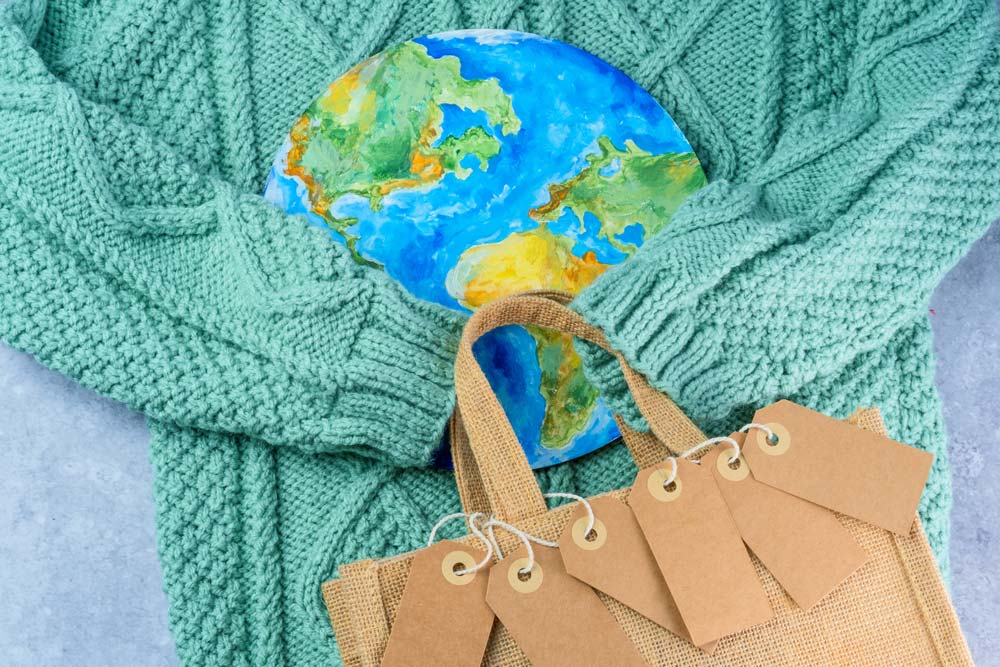How Leading Apparel Brands Can Make a Positive Environmental Impact
Article
Considering the environmental consequences of the holiday shopping season, we’ve compiled six suggestions for how apparel brands and manufacturers can achieve a positive environmental impact.
From the sourcing of textiles, the dyes and manufacturing processes, to packaging and transport, there are a lot of carbon emissions, harmful chemicals and wastewater pollution involved in the production of apparel. In 2019, Forbes stated that “worldwide, approximately 17 billion items are being returned yearly. This totals to 4.7 million metric tons of CO2 emitted yearly” for returns alone. Following a global pandemic and a boom in eCommerce, this number has no doubt significantly increased. Living in a culture of fast fashion and free returns only exacerbates these habits, encouraging people to overbuy and then send items back that don’t suit them or don’t fit. Statista reported clothing (88%) and shoes (44%) as the most returned products in 2021, in part because there is still no standard sizing across all brands, leaving consumers to guess what sizes might fit best.
Added to this challenge, society has transformed over the last centuries, from a culture that treasures items until they can no longer be mended to a culture of mass consumption, discarding items and buying new whenever we see fit. Taking the Christmas holiday in Great Britain as an example, it has become trendy to wear garish jumpers during the holiday season. But a Hubbub report stated that in the UK, 25% of Christmas jumpers are thrown away, while a third of people under the age of 35 buy a new festive jumper every year. That means that at best, jumpers are only worn a few times during the holidays and then never again. Across the pond, the average US consumer throws away 81.5lbs of clothes every year.
Overall, the fashion industry is responsible for about 20% of global wastewater and is the second biggest carbon emissions generator. If this fast-fashion trend continues as it has, the wastage is expected to surge to 134 million tonnes a year by the end of the decade. The apparel industry needs all the tools, motivation and regulatory framework it can get to reverse this trend.
6 Sustainability Tips
It is more important than ever for brands and their supply chains to make more sustainable choices. So here are a few suggestions for this holiday season:
- Agree on standardized sizes – Fashion brands should collaborate to agree on a standard set of measurements for garments that enable people to buy one size with confidence. This will reduce overbuying and returns and make for a better customer experience.
- Track chemical usage – Use a platform, such as CleanChain, to track your chemical inventory across your supply chain. If harmful chemicals are being used, you can quickly identify these and seek more sustainable alternatives.
- Repurpose unsold stock – Destroying stock might be the cheapest way to protect your brand and any unsold items, but it’s far from sustainable. Instead, think about how you might donate it, sell it to another brand, repurpose it through a particular supplier or collaborate with others to find alternative ways to use the stock. Fashion tends to come back around, so it may fly off the shelves in the future—a little creative marketing may be all that is required.
- Use virtual fitting rooms – Utilize technology like AR and VR to provide virtual changing rooms for your customers. This way customers can try on the clothes and styles before buying, saving future returns and the need to wash so many garments.
- Use more sustainable fibers and fabrics – From fungi leather to bamboo, synthetic spider silk and pineapple leaf fiber, some very exciting, more environmentally friendly alternatives are available to brands and their supply chains. Most brands are keenly aware of all this but don’t put as many resources into using sustainable alternatives as they could.
- Think critically about packaging – Does each item really need to be individually wrapped? Does the box need to be that big? Find innovative packaging suppliers that have conducted a Life Cycle Assessment (LCA) of alternatives to identify the types of materials and designs with the lowest environmental impact. Little changes in packaging can make a big difference in the long run, especially with regard to the weight and therefore the fuel used during transportation, ultimately saving your company money.
Whatever your plans for 2023, consider integrating some or all of these sustainability measures. Failure to actively improve one’s sustainability poses a great risk to a brand’s reputation and is a threat to suppliers who may lose business if they can’t keep up with the wave of transformation that is already starting to take hold.
Like to learn more about how CleanChain can help you track your chemical inventory across your supply chain? DISCOVER MORE








